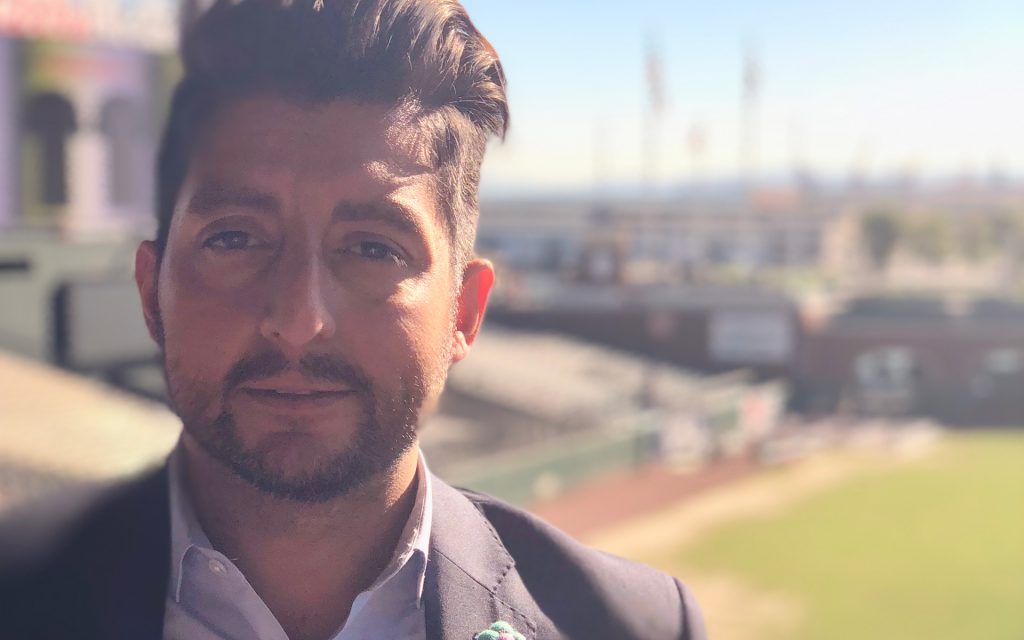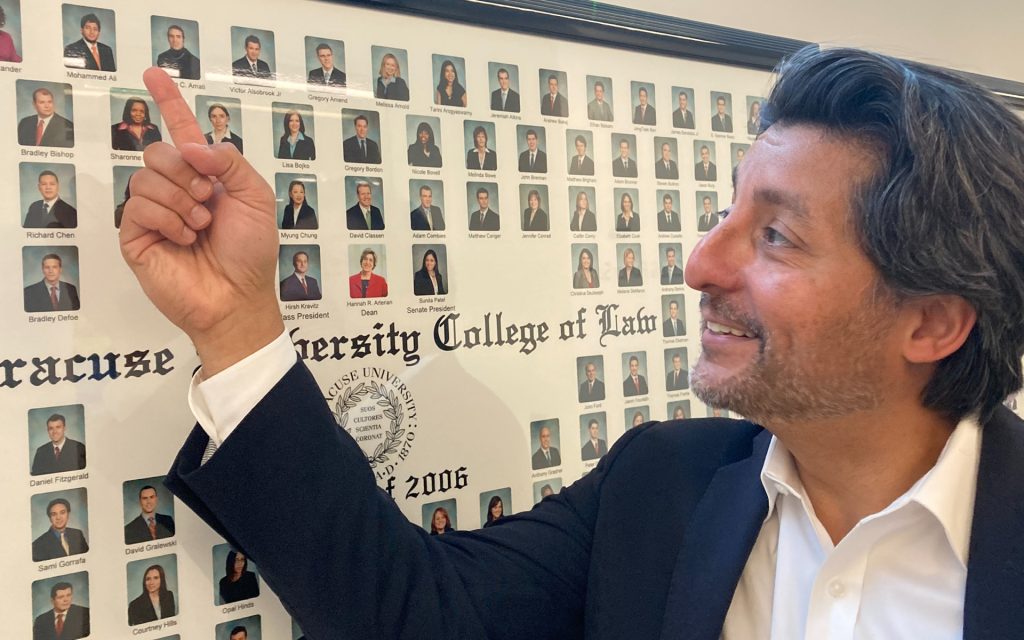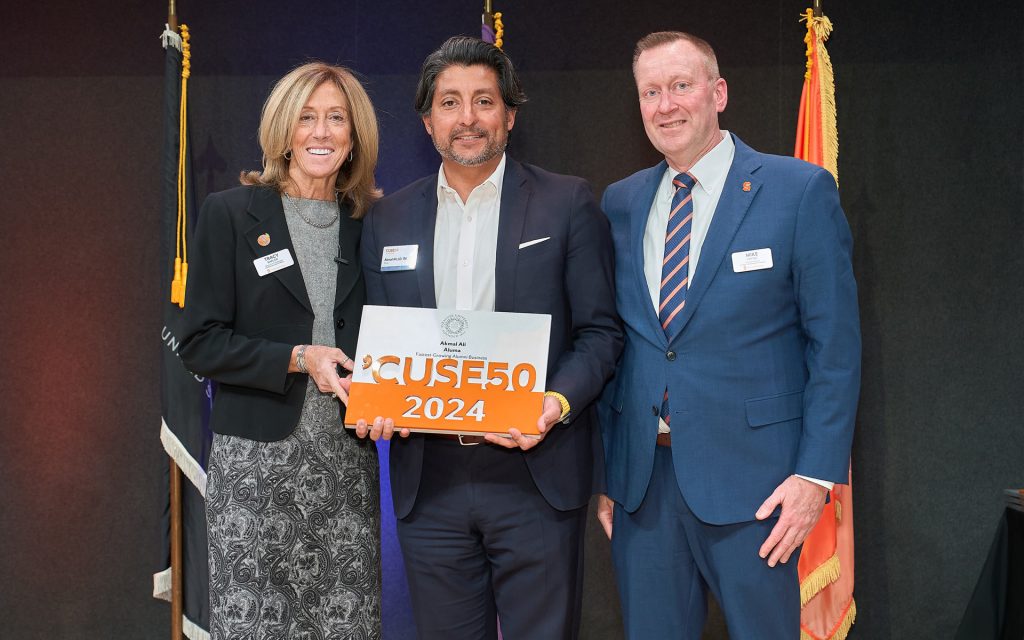
When you attend a concert or baseball game, it’s become routine to go through a metal detector or be screened by security, but most people don’t think about what goes on behind the scenes to make sure that large venues, like stadiums, airports or government entities, are safe from acts of terrorism, cybersecurity breaches or other risks that impact the public. Thankfully, Akmal Ali L’06 and his team at Aluma think about it every day.

In recognition for the success of Aluma, a risk management and security consulting firm founded by Ali, Syracuse University recognized him with a ‘CUSE50 Alumni Entrepreneur Award in November. In its second year, the ‘CUSE50 awards recognize 50 fastest-growing alumni businesses owned or led by Orange graduates University-wide.
The son of Afghan refugees, Ali was born and raised in Florida. He always had two dreams: go to law school and live in Washington, D.C. He’s achieved both, but his determination to do so brought him to Syracuse Law along the way.
The events of 9/11 left a permanent impression on Ali, who was an undergraduate at Rollins College at the time. So, when he decided to pursue law school, he chose Syracuse Law for its program on national security and counterterrorism law. Along the way, he discovered a mentor in now Professor of Law Emeritus William C. Banks, founder of the Syracuse Law’s Institute for National Security and Counterterrorism (INSCT).
Although he enrolled at Syracuse Law, Ali never intended to become a practicing attorney. Instead, he wanted the skillsets of critical thinking and problem solving that came from a law school education.

After earning his J.D., he went straight to work at the Department of Homeland Security (DHS) in his dream city of Washington, D.C. In response to the 9/11 attacks, the U.S. government created the DHS, and Congress enacted the Support Anti-Terrorism by Fostering Effecting Technologies (SAFETY) Act, which incentivizes private companies to do more to reduce risk exposure.
Ali began as a research associate for the SAFETY Act Office at DHS. Two years later, he was named deputy director responsible for public and private partnerships, working in sports and large venue security, cybersecurity, risk management, mass transit security and more in collaboration with federal and state government agencies like the Department of Defense and the State Department. Ali was, in fact, vital in expanding the SAFETY Act program within the private sector, and today his work remains a primary feature of the program.
However, as Ali grew in his role with DHS, he began noticing that applications for SAFETY Act awards were primarily coming from the private sector, which could be better served by a consultant who understood both the security best practices and the legal background needed to traverse the DHS application processes. He knew he could do better, so with his degree from Syracuse Law and experience at the DHS, Ali entered the private sector at an existing consulting firm.
“To assist someone in getting a SAFETY Act award, you have to be a really good risk manager and security expert to help your clients with best practices, as well as offer recommendations and identify emerging technologies,” Ali explains.
Ali’s first client was the New York Yankees. Next came the New York Mets, and soon Ali was working with other sports teams, as well as venues like airports, the Port Authority of New York and New Jersey and Madison Square Garden. He also starting giving security input during the design process of venues yet to be built.
In 2019, he founded Aluma. “I knew I had the experience, so I decided to hang out my own shingle and bet on myself,” he says.
“I’ve put a lot of work into my business, but much of my foundation was built at Syracuse Law. I soaked up so much information on counterterrorism and the law and learned skill sets that allowed me to create a business that is helping to keep people and places safer—and that’s very rewarding.”
—Akmal Ali L’06
Today, clients such as the NFL, Live Nation, and MGM Resorts come to Aluma to leverage its expertise in order to pursue benefits from the SAFETY Act with the priority of keeping people safe while still allowing for an outstanding guest experience.
Ali notes that security focuses have changed throughout his career. After 9/11, the biggest threats on people’s minds were sophisticated attacks of terror like the strikes on the World Trade Center, but, today there are other threats to be mitigated.
“What we’ve seen the most over the last decade are bad actors going for the low hanging fruit—less sophisticated actions like sniper threats, vehicles ramming into crowds, small firearm or knife attacks, and even drones,” he explains. “The impact might seem smaller, but any of these threats can add up to a lot of damage.”
Recently AI has come into play in the risk and security assessment sector, as technology continues to become more sophisticated and connect everything, everywhere. Aluma is continuously working to utilize AI positively, while also staying ahead of abuse of this sophisticated technology.
“If you’re sitting at 500 camera feeds in a command center looking to spot a bad actor, one person can only notice so much. It’s like finding a needle in a haystack,” Ali says. “But, AI can use video analytics to search thousands of people and then trigger an alert that prompts human action. AI is amazing technology that will eventually be used to help security professionals write or update their security policies, so we’re staying on top of that.”
His vast knowledge of law, government and security threats have certainly put him and his business on top. Ali is proud to have received a ‘CUSE50 award in recognition for the highly successful business he created in Aluma.

“Visiting campus and walking through the new law school at Dineen Hall was a thrill, and it was an honor to come back to the University and receive a ‘CUSE50 award,” says Ali. “I’ve put a lot of work into my business, but much of my foundation was built at Syracuse Law. I soaked up so much information on counterterrorism and the law and learned skill sets that allowed me to create a business that is helping to keep people and places safer—and that’s very rewarding.”
